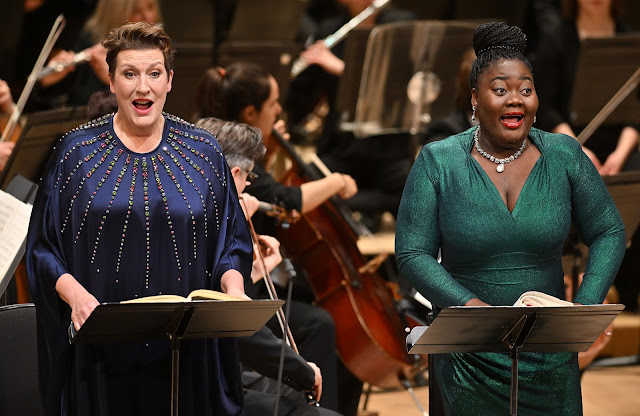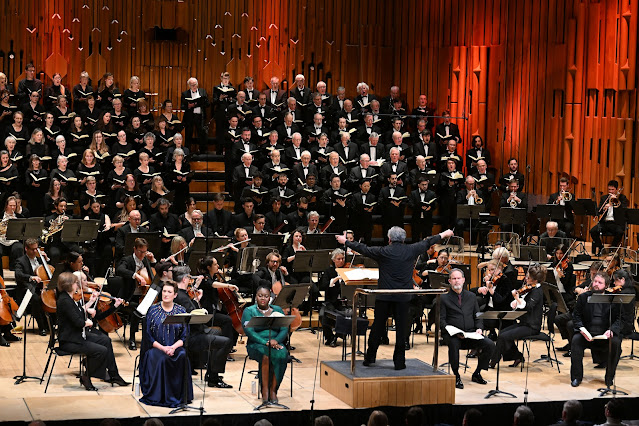Mendelssohn: Elijah; Gerald Finley, Masabane Cecilia Rangwanasha, Sarah Connolly, Allan Clayton, Guildhall Voices, London Symphony Chorus, London Symphony Orchestra, Sir Antonio Pappano; Barbican Hall
Reviewed 28 January 2023
A satisfying, well-thought-out performance of Elijah with a consummate account of the title role from Gerald Finley, plus chorus and orchestra on thrilling form
It is tempting to think of Mendelssohn's Elijah as an opera manqué. But like Handel in some of his more dramatic oratorios, Mendelssohn took full advantage of the non-operatic presentation which meant that dramaturgy could be creative, he could rely on the audience being able to fill in the gaps by reading the libretto and most importantly, large choral numbers could expand considerably.
So what happens when a conductor best known in London for his operatic work, conducts Mendelssohn's Elijah?
On Sunday 28 January 2024, Sir Antonio Pappano, chief conductor designate of the London Symphony Orchestra, conducted the orchestra and the London Symphony Chorus in Mendelssohn's Elijah at the Barbican Hall (the first of two performances), with soloists Masabane Cecilia Rangwanasha, Dame Sarah Connolly, Allan Clayton and Gerald Finley, with The Guildhall Singers.
But first off, which version of Elijah were we hearing? Pappano used the standard four soloists, with Gerald Finley in the title role, plus treble Ewan Christian (head chorister of Westminster Cathedral Choir) as the child, but added into the mix The Guildhall Singers.
 |
| Mendelssohn: Elijah - Sarah Connolly, Masabane Cecilia Rangwanasha, London Symphony Orchestra - Barbican Hall (Photo: Mark Allan) |
Eight students from the Guildhall School of Music & Drama, the Guildhall Singers (Bridget Esler, Zoe Jackson, Alex Hutton, Abbie Ward, Sebastian Hill, Jacob Cole, Matias Carbonetti Schwanek, Jacob Dyksterhouse) supplied the voices for the Angels - first quartet, the octet, the trio and the semi-chorus in 'Holy, Holy, Holy'. Thus giving us the contrasts in textures that Mendelssohn requires (his first performance used a whopping ten soloists) without having to use eight, underused big-name soloists.
This was a pragmatic decision which seemed to reflect Pappano's approach to the whole work. The orchestral playing from the first notes of the overture was often lithe with a sense of highly detailed markings which reflected Mendelssohn's original; I remember Raymond Leppard saying about the work, when he conducted it with the London Philharmonic Orchestra and Chorus in the 1980s, that this was the work of a young man and that Mendelssohn's markings reflect this. Pappano largely avoided the sort of full-fat, late Romantic sound that is simply inappropriate for Mendelssohn. Speeds were often fleet, but apposite, the sound world full of colour and detail and there were little moments that I noticed, such as the cello obbligato in Elijah's 'It is enough' being played with minimal vibrato, thus creating a wonderfully plangent sound.
When it came to the chorus, Pappano seemed to have a good rapport and in the bigger moments things let rip, but he also got plenty of textual detail from them too. I was impressed at how much text the chorus got across, which meant that the chorus parts were as detailed as the orchestral. The large choruses were kept moving, but oh boy was it a big sound. There is something about the acoustic of the Barbican Hall that focuses a big choral sound, and frankly, there were moments when the chorus swamped the detail in the orchestra (at the end of Part One, you could see the strings busily playing away but the detail was lost). But Pappano never revelled in this for its own sake, this was a performance that had dramatic impetus whilst allowing for these big pause points, when composer and librettist take time out for vivid, vigorous choral contemplation.
 |
| Mendelssohn: Elijah - Antonio Pappano, Gerald Finley, Allan Clayton, Ewan Christian, London Symphony Orchestra - Barbican Hall (Photo: Mark Allan) |
Gerald Finley's Elijah was dignified, often moving and beautifully sung, along with a superb delivery of the text. This was a serious without an element of bluster, yet Finley knew how to impose himself when needed; this was a performance by a great singing actor rather than one simply using volume to dominate. Wonderfully trenchant when dealing with the followers of Baal, his prayers and quieter arias had a lovely inwardness and sense of meaning to them, always underpinned by a feeling of underlying vocal power and strong sense of line.
Soprano Masabane Cecilia Rangwanasha gave a feeling of vividness to everything she sang. A vividly urgent widow who was no shrinking violet, Rangwanasha delivered a serious, meaningful account of 'Hear ye, Israel', the vibrancy in her voice adding intensity to the lyricism. In everything, she seemed to invest fully, so that even her small intervention as an Angel in Part Two had an urgency to it.
Mezzo-soprano Sarah Connolly brought warm tone, lovely flexibility and a sense of investment in the words to her recitative interventions in Part One, with a dignified account of 'Woe unto them' that really committed to the meaning. In Part Two, her Jezebel was strong and determined, like Finley, she imposed herself without bluster and the dialogue with the chorus fizzed with excitement. The culmination of her performance, however, was a beautifully flowing and movingly understated account of 'O rest in the Lord'.
 |
| Mendelssohn: Elijah - Gerald Finley, London Symphony Orchestra Barbican Hall (Photo: Mark Allan) |
Ewan Christian as the child sang with accuracy and aplomb, his finely true tone contrasting beautifully with Finley's trenchant delivery as Elijah and the big-boned chorus. The eight singers from the Guildhall Voices contributed a series of beautifully sung ensembles as the angels. These were individual voices in a well-blended consort rather than a semi-chorus and individual vibrancy of tone helped to give each of the ensembles character, the octet in particular was very moving whilst I noted that one of the soloists was counter-tenor Alex Hutton, recalling Mendelssohn's comments about the corps of bearded altos in his original Birmingham chorus.
Though nothing was said in the programme, the work seemed to be being sung in an adjusted, modernised version of William Bartholomew's original English translation, so that 'laveth the thirsty land' became 'revives the thirsty land', though this was not reflected in the printed text.
This was a satisfying, well-thought-out performance of Elijah with a consummate account of the title role from Gerald Finley. On the podium, Antonio Pappano combined drama with thoughtfulness and showed a willingness to investigate what was needed to make the piece work with modern ensemble yet on its own terms. As I have said, the acoustic of the hall was not idea, but with chorus, orchestra and soloists on such terrific form, who can complain.
The performance was being recorded for future broadcast on Marquee TV and for release on LSO Live.
Never miss out on future posts by following us
The blog is free, but I'd be delighted if you were to show your appreciation by buying me a coffee.
Elsewhere on this blog
Planet Hugill at Le Piano Symphonique 2024
- From Classical to Romantic: I chat to Michael Sanderling about the Lucerne Symphony Orchestra - interview
- A winter week focusing on the piano yet hosted by an orchestra: intendant Numa Bischof Ullmann introduces Lucerne's Le Piano Symphonique & looks forward to the 2025 festival - interview
- Homage to Liszt: pianist Benjamin Grosvenor on astonishing form in Liszt and Brett Dean - concert review
- Liszt Cycle 2: From large-scale Liszt and Wagner to intimate Schumann and Schubert - concert review
- Made in Switzerland: tenor Daniel Behle and pianist Oliver Schnyder combine musicality and intelligence - concert review
- Liszt Cycle 1: From poetic Liszt and Grieg concertos to a little bit of magic from Martha Argerich and friends - concert review
- Awash with musical history: Thea Musgrave's Mary, Queen of Scots at Oper Leipzig, Shostakovich celebrated by Gewandhausorchester, Leipzig Music Trail, Mendelssohn Haus, Bach Archiv & more - feature
- Let the dialogue flow: Benjamin Bernheim leads a wonderfully memorable account of Massenet's Werther in Zurich - concert review
- An evening of bold & adventurous programming: wind & brass from Southbank Sinfonia & Britten Sinfonia combine - concert review
- Eavesdropping on their dramas: Opera North's 'in the round' production Britten's Albert Herring - opera review
- A shelter where people can be sure of quality and find so much to discover: founder Michael Adda on his record label, La Dolce Volta - interview
- Byrd Compared: Phantasm & Anna Prohaska celebrate the consort song - concert review
- Slowly, through a process of osmosis, the piece and I are slowly becoming acquainted: horn player, Ben Goldscheider on Gavin Higgins' new Horn Concerto - guest posting
- Home




.jpg)







No comments:
Post a Comment